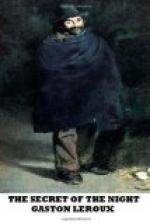But — what? The voice of Feodor lost its threatening tone. His breath came as from a weeping child. And it was with sobs in his throat that he said the last verse, the verse written by his daughter in the album, in red letters:
“The last barricade had standing
there the girl of eighteen
winters, the virgin
of Moscow, flower of the snow.
Who gave her kisses to the workmen struck
by the bullets
from the soldiers of
the Czar;
“She aroused the admiration of the
very soldiers who, weeping,
killed her:
“What killing! All the houses
shuttered, the windows with heavy
eyelids of plank in
order not to see! —
“And the Kremlin itself has closed
its gates — that it may
not see.
“The youth of Moscow is dead!”
“Feodor! Feodor!”
She had caught him in her arms, holding him fast, comforting him while still he raved, “The youth of Moscow is dead,” and appeared to thrust away with insensate gestures a crowd of phantoms. She crushed him to her breast, she put her hands over his mouth to make him stop, but he, saying, “Do you hear? Do you hear? What do they say? They say nothing, now. What a tangle of bodies under the sleigh, Matrena! Look at those frozen legs of those poor girls we pass, sticking out in all directions, like logs, from under their icy, blooded skirts. Look, Matrena!”
And then came further delirium uttered in Russian, which was all the more terrible to Rouletabille because he could not comprehend it.
Then, suddenly, Feodor became silent and thrust away Matrena Petrovna.
“It is that abominable narcotic,” he said with an immense sigh. “I’ll drink no more of it. I do not wish to drink it.”
With one hand he pointed to a large glass on the table beside him, still half full of a soporific mixture with which he moistened his lips each time he woke; with the other hand he wiped the perspiration from his face. Matrena Petrovna stayed trembling near him, suddenly overpowered by the idea that he might discover there was someone there behind the door, who had seen and heard the sleep of General Trebassof! Ah, if he learned that, everything was over. She might say her prayers; she should die.
But Rouletabille was careful to give no sign. He barely breathed. What a nightmare! He understood now the emotion of the general’s friends when Natacha had sung in her low, sweet voice, “Good-night. May your eyes have rest from tears and calm re-enter your heart oppressed.” The friends had certainly been made aware, by Matrena’s anxious talking, of the general’s insomnia, and they could not repress their tears as they listened to the poetic wish of charming Natacha. “All the same,” thought Rouletabille, “no one could imagine what I have just seen. They are not dead for everyone in the world, the youths of Moscow, and every night I know now a chamber where in the glow of the night-lamp they rise — they




